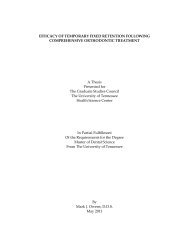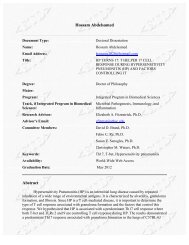Eileen A. Owen-Williams - ETD Index Page
Eileen A. Owen-Williams - ETD Index Page
Eileen A. Owen-Williams - ETD Index Page
You also want an ePaper? Increase the reach of your titles
YUMPU automatically turns print PDFs into web optimized ePapers that Google loves.
<strong>Eileen</strong> A. <strong>Owen</strong>-<strong>Williams</strong><br />
Document Type:<br />
Name:<br />
Email Address:<br />
Title:<br />
Degree:<br />
Major:<br />
Program:<br />
Track, if Integrated Program in Biomedical<br />
Sciences:<br />
Research Advisor:<br />
Advisor's Email:<br />
Committee Members:<br />
Keywords:<br />
Availability:<br />
Doctoral Dissertation<br />
<strong>Eileen</strong> A. <strong>Owen</strong>-<strong>Williams</strong><br />
owenwile@seattleu.edu<br />
The Traditional Roles of Caring for Elders:<br />
Views from First Nations Elders Regarding<br />
Health, Violence, and Elder Abuse<br />
Doctor of Philosophy<br />
Nursing<br />
Nursing<br />
NA<br />
Michael Carter, DNSc, DNP<br />
mcarter@uthsc.edu<br />
Carolyn Graff, Ph.D.<br />
Graduation Date: May 2012<br />
Carol Lockhart, Ph.D.<br />
Antonia Mills, Ph.D.<br />
Patricia Speck, Ph.D.<br />
Community Participatory Research<br />
Determinants of Health<br />
Elder Abuse<br />
First Nations<br />
Intergenerational Relationships<br />
Residential Schools<br />
World-Wide Web Access
Abstract<br />
This study sought to respectfully understand Northern British Columbia First Nations Elders'<br />
views regarding health of communities, intergenerational relationships, Elder roles, and violence<br />
towards Elders. Injuries, both intentional and unintentional, are a leading cause of death for First<br />
Nations Peoples. Information regarding Elder abuse in First Nations communities is lacking,<br />
though family violence has been identified as a problem within First Nations communities. The<br />
goal of this research was to understand the point of view and Elders' reality through the creation<br />
of a dialogue with Elders, and to discern the interface between Traditional First Nations' belief<br />
systems, healing methods, and current legal and health care systems within Canada.<br />
This study used a community-based participatory research design to explore social and cultural<br />
context through the views of Carrier Sekani Elders in the Ts'il Kaz Koh community. The design<br />
acted to support the aims of the study which were: To explore how First Nations Elders<br />
understand violence in their communities, to explore what First Nations Elders believe gives rise<br />
to violence in First Nations communities; to illuminate the factors that First Nations Elder view<br />
as affecting the safety and well-being of Elders living in First Nations communities; to explore<br />
First Nations Elders' narration of intergenerational relationships before and after contact; and to<br />
make clear factors which First Nations Elders view as required for Elders to remain safe and stay<br />
within their respective communities.<br />
The study followed the CIHR Guidelines for Research with Aboriginal Peoples. Approval was<br />
obtained from Carrier Sekani Family Services' Research Review Committee, from the Ts'il Kaz<br />
Koh Chief and Council and Ts'il Kaz Koh Community, the Ethics Review Board of the<br />
University of Northern British Columbia, and the Institutional Review Board of the University of<br />
Tennessee. Informed consent was obtained both from the Ts'il Kaz Koh community and from<br />
participating Elders, utilizing Ts'il Kaz Koh cultural protocol. Six Ts'il Kaz Koh Elders residing<br />
in Northern British Columbia participated in interviews utilizing an interview guide. Interviews<br />
were then read, categorized, and coded according to identified concepts, allowing for retrieval of<br />
themes. Codes were submitted to two committee members for review and consensus regarding<br />
the categories of each code for reliability. Both a domain analysis and a taxonomic analysis were<br />
performed on the data. A convergent analysis of themes was performed to assure internal and<br />
external validity. The findings were presented to the Elders at each step of the analysis to ensure<br />
validity and reliability. The final document was presented to the community to ensure that all<br />
information was accurate and acceptable to the community.<br />
Limitations of the study include the limited sample of Elders solely from the Ts'il Kaz Koh<br />
(Burns Lake) community. This limitation is also viewed as an opportunity for the Ts'il Kaz Koh<br />
to request program development funding as a pilot initiative. This sample limited to one First<br />
Nations community prohibits the generalization of findings to other communities until further<br />
research occurs with other communities.<br />
Themes related to the problems of violence were multiple, including changes from Traditional<br />
way of living to contemporary way of life, changes from the Residential School experience, loss<br />
of Traditional roles, and change in community from communal structure to that of nuclear family
units, and the influence of alcohol and drugs on individuals and families. Sub-themes related to<br />
violence included the loss of intergenerational relationships, changes in Elder roles from the past,<br />
and the change in roles and behavior from the past across all ages. Also identified as sub-themes<br />
were the influences of change from that of communal caring, to individuals watching out for<br />
their own welfare, and the change from hard work being valued within Traditional roles to lack<br />
of value for hard work in contemporary society. Disruption of intergeneration roles within the<br />
community was also identified as a theme related to violence.<br />
Recommendations from this study include the need to further research the views of Elders<br />
surrounding violence and Elder abuse in other First Nations communities, with translation to<br />
clinical practice and the development of a culturally appropriate screening tool for First Nations<br />
Elder safety and abuse. Further research with other First Nations communities will allow<br />
generalization of results to be utilized in program development and evaluation. This study<br />
supports the utilization of the health determinants model in program planning and the developing<br />
of capacity for First Nations to control their health care services. The findings of this study also<br />
support the need for funding of Youth-Elder initiatives which foster the re-establishment of<br />
intergenerational relationships and the concurrent translation of Elders' Traditional knowledge.<br />
Utilizing Elders as leaders and a source of Traditional health knowledge is part of a viable model<br />
of combining contemporary and Traditional health care practices. The Elders' views supported<br />
the importance of a strength-based approach to healing with the prior work of McCormick who<br />
found that effective healing for First Nations people must have a focus on "interconnectedness"<br />
rather than personal autonomy in order for communities to heal. This study would like to<br />
acknowledge the strength of these Elders and the Ts'il Kaz Koh community to deal with the<br />
historical trauma of Residential Schools and the effects on individual, family and community<br />
health.<br />
Attached File(s)<br />
pdf (1.1 Mbytes). This pdf best viewed using the latest version of Acrobat Reader. .<br />
| Back to <strong>ETD</strong> <strong>Index</strong> <strong>Page</strong> | Back to CGHS Home <strong>Page</strong> |<br />
Revised 30 April 2012
















